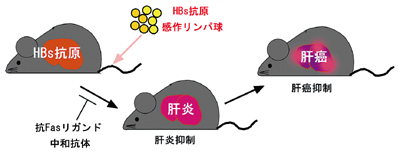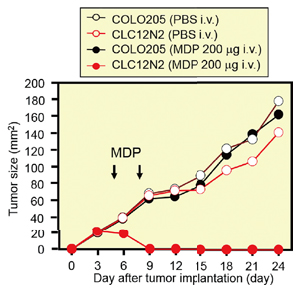Organization
Division of Immunology and Molecular Biology
Staff

Professor
SUDA, Takashi

Associate Professor
TSUCHIYA, Kousuke

Assistant Professor
KINOSHITA, Takeshi
Aims, Ongoing Projects, and Recent Achievements
Each cell composing our body is programmed to kill itself when necessary. Apoptosis is a common type of such programmed cell death. To prevent oncogenesis, cells often die by apoptosis when their genes are severely damaged by radiation, oxidative stress, etc. Many chemotherapeutic agents also induce apoptosis in tumor cells.
Meanwhile, recently, it was revealed that dying and/or dead cells release a variety of inflammatory factors. Because many cells were killed in tumors by hypoxia, anti-tumor immune responses, or therapeutic treatments, it can be assumed that dead cell-derived inflammatory factors contribute to the generation of inflammatory environment of tumor tissues, and hence play an important role in the tumor development. In addition, several novel modes of programmed cell death that are clearly distinct from apoptosis have been discovered.
In our laboratory, we are studying the molecular mechanisms of induction and execution of programmed cell death, and dead cell-derived inflammatory factors, aiming to find new strategy to induce programmed death of tumor cells that is greatly effective for tumor eradication.

Therapeutic effect of an anti-FasL antibody in an animal model of chronic hepatitis.
We have demonstrated that a neutralizing antibody against Fas ligand (FasL), an apoptosis-inducing protein, has therapeutic potential in animal models of inflammatory diseases including hepatitis. Furthermore, this antibody prevented hepatic cancer development in an animal model of chronic hepatitis. We also discovered that FasL induces release of various inflammatory cytokines from dying cells.

Tumor therapy model by inducing pyroptosis.
Pyroptosis is a non-apoptotic inflammatory programmed cell death. We established a model tumor cell line (CLC12N2) by introducing an artificial protein that induce pyroptosis in response to muramyl dipeptide (MDP) treatment into the COLO205 human colon cancer cell line. CLC12N2 (but not COLO205) tumor implant in nude mice were rejected when pyroptosis was induced by intravenous injections of MDP (arrows).

